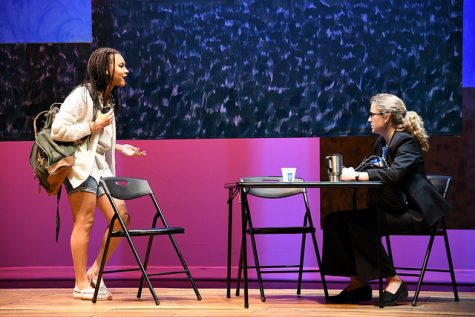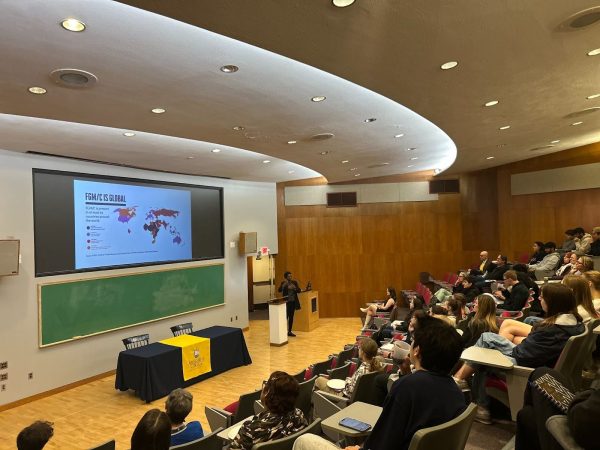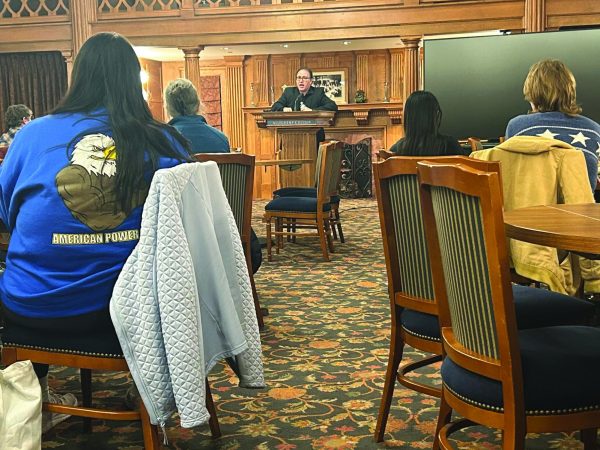Playshop Theatre’s performance of ‘Luna Gale’ captures complexities of social issues in 21st century America
The Allegheny College Playshop Theatre performed “Luna Gale,” written by Rebecca Gilman, from Feb. 23 to Feb. 26 in the Gladys Mullenix Black Theatre at the Vukovich Center for Communication Arts. Mark Cosdon, assistant professor of communication arts, directed the play.
“It had been some years since I worked on a play that was a social realism,” Cosdon said. “[Luna Gale] wasn’t theatrical, it wasn’t a musical, it wasn’t a farce, it wasn’t a comedy but rather was a play that even though was set in Cedar Rapids, Iowa, I think felt very familiar. I think it felt like it could be anywhere in the United States.”
The performance begins when Caroline, an over-worked but caring social worker, assumes the case of two teenaged meth addicts, Karlie and Peter, who are fighting over custody of their baby, Luna Gale, with Karlie’s extremely religious mother, Cindy.
While mediating the fight between the two parties, Caroline butts heads with a co-worker, wrestles with the demons of her past and exposes Karlie’s deepest secret — that her stepfather raped her when she was 15. In the end, many of the characters are still stuck in the same difficult positions with which they started.
“What I was hoping an audience would respond to and take away from the performance was the work of social workers and the many gifts that they bring to the work they’re asked to execute and carry out every day,” Cosdon said. “I think in a lot of ways social workers today operate as angels of sorts, that they often times are underrecognized and underappreciated for the work that they do.”
The play also portrayed themes such as addiction, emotional abuse, religion and sexual assault. A note warned viewers of the controversial and sensitive themes of the play in the “Luna Gale” program and the play’s online advertisement.
The actors and actresses were exposed to the play’s emotional content daily since the beginning of December.
Alyssa Johnson, ’20, said her religious views aligned closely with those of her character Cindy.
“I went through a period of time where all of Cindy’s views are being attacked in the show and I kind of felt like I was being attacked,” Johnson said.
Johnson said the experience emotionally exhausted her and was the greatest obstacle she faced during the making of the show.
Simon Brown, ’19, who played the character of Peter, had to deliver a monologue about Cindy’s husband raping Karlie, who was played by Ada Zech, ’19.
“There was one day where I was trying to memorize it off-book and I just started crying while doing it,” Brown said.
The cast of “Luna Gale” had only seven members. The week before opening night, the cast and crew spent three to nine hours rehearsing each day.
“It was really interesting to see how each individual actor was able to grow over the course of the rehearsal process,” Brown said.
The play drew in more than 500 spectators over the course of four performances.
One of those spectators, Janabeth Dellamedaglia, ’20, said the play was engaging throughout.
“The play was intense. I was on the edge of my seat the entire time and just wanted to know what was happening next,” Dellamedaglia said.
Audience member Brennen French, ’17, said if he could only use one word to describe the play it would be real.
“One of the biggest issues in the show was even though there are systems in place to help people, the systems don’t always work, and they don’t always catch everyone,” French said. “This raises the idea if we’re going to have these systems, we really need to be putting the money and the time into them so that they can be working at the capacity they can be.”

Samantha Richardson, ’20, and Mary Lyon, ’17, perform in “Luna Gale” at their dress rehersal on Tuesday, Feb. 21, 2017. The Allegheny College Playshop Theatre presented “Luna Gale” from Thursday, Feb. 23 through Sunday, Feb. 26 in the Gladys Mullenix Black Theatre in the Vukovich Center for Communication Arts.
Cosdon said he is not sure if there is a significance behind the name “Luna Gale,” but that the audience members are welcome to analyze it for themselves. He said he had a number of reasons for choosing “Luna Gale” to produce, one being that he admired Rebecca Gilman’s work.
“It was a work I wanted to direct largely because of its focus upon Caroline and the significant difficulties she confronts as she tries to act in what is the best interest of the child,” Cosdon said. “I was also very moved by the idea of a social worker whom the overwhelming majority face tremendous burnout, immense workload issues and caseload issues.”
Cosdon said he was drawn to Gilman’s use of characters who seem to be all too human and her portrayal of a societal issue that is not easily resolved.
Caroline, played by Mary Lyons, ’17, displays human characteristics. They are demonstrated when she has a bias toward Cindy because Cindy’s passivity is analogous to her own mother’s. However, the crux of Caroline’s character is her positive attributes, according to Cosdon.
“Caroline gave her life over to service,” Cosdon said. “What could be a greater gift than that of service to one’s fellow humans?”







